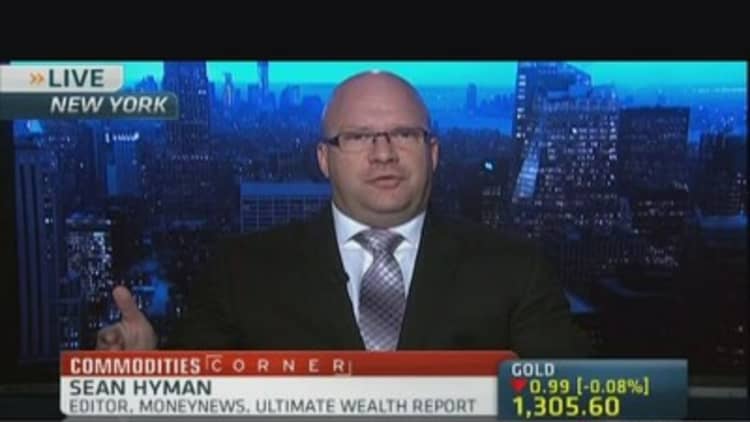
Amid uncertainty in the U.S. and risk aversion in global markets, gold's performance as a traditional safe-haven has proved lackluster. Yet one strategist reckons the precious metal could rally as much as 20 percent in the next one to three months.
Sean Hyman, editor of the Ultimate Wealth Report, a financial newsletter, says the reason for the bullish call is partly based on a view that under Janet Yellen the Federal Reserve is likely to maintain its hefty monetary stimulus, fueling inflation and boosting demand for gold as an inflation hedge.
U.S. President Barack Obama on Wednesday nominated Yellen, the Fed's Vice Chairman, to replace Ben Bernanke when he steps down as Fed chief in January.
"Gold is having a traditional pull-back and I think we will have another run up to the $1,500, $1,600 level in the next one or two or three months," Hyman told CNBC Asia's "Squawk Box" on Thursday.
(Read more: Obama nominates Janet Yellen to lead US Federal Reserve)
A move to $1,600 would imply a gain of almost 23 percent from current levels around $1,302 per ounce.
Gold has been stuck in a narrow range roughly between $1,280 and $1,320 since a budget impasse in Washington triggered a partial shutdown of the government on October 1. It is down about 22 percent in the year-to-date.
Safe-haven?
Uncertainty about the budget stalemate and fears about a looming deadline to raise the debt ceiling have supported gold. But the precious metal has not received the same boost as other safe-havens such as the Japanese yen, which hit a two-month peak against the dollar this week.
(Read more: As lengthy shutdown looms, why isn't gold rallying?)
"This (move in gold) is a very curious development," said Gaurav Sodhi, resources analyst at the Intelligent Investor. "If you had asked a couple of weeks ago what would happen to gold in the event of the current situation, every gold analyst would have said gold should move higher because historically that's what happens at times of economic and political uncertainty."
Simona Gambarini, associate director of research at ETF Securities, told CNBC earlier this week that the gold trade was not necessarily over and that most investors were on the sidelines waiting to see how U.S. developments pan out.
Hyman said that ultimately gold would respond to the jitters about a looming debt ceiling as well as the outlook for U.S. monetary policy.
"Yellen will have the same concepts as Bernanke. So money will continue to be printed, the economy stimulated and interest rates kept low as possible and that's going to stimulate inflation, be good for commodities and bad for the dollar," he said.
Markets, which had been braced for a scaling back of the Fed's $85 billion-a-month bond-buying program, were taken by surprise last month when the central bank opted to maintain its monetary stimulus.
(Read more: Fed battled over ending bond-buying: Minutes)
"I'm not a gold bug, I don't think every day and any day is a day to own gold, but I do feel we are now in that phase to own gold," Hyman said.
—By CNBC.Com's Dhara Ranasinghe; Follow her on Twitter @DharaCNBC


